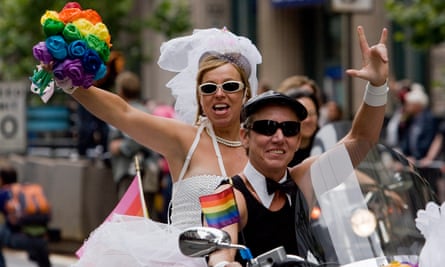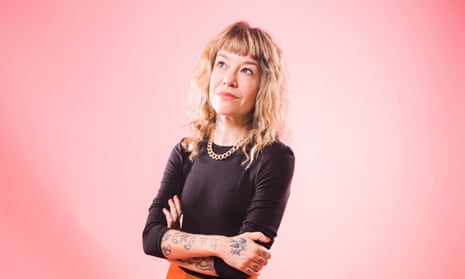When the author Michelle Tea began writing in her early 20s, it was, she says, entirely compulsive. She had come through a series of traumatic experiences including the discovery that her stepfather had drilled a hole in the wall of her bedroom in Chelsea, Massachusetts, in order to spy on her, and what she calls her “lesbian feminist nervous breakdown”, a sexual and ideological awakening that she laughs about now but at the time she found “overwhelming”. Ten years later, Tea read an essay in the New Yorker about the Harvard neuroscientist Alice Flaherty’s experiences of hypergraphia following a miscarriage, meaning she was possessed with the need to write her story. “Reading this experience of what it felt in her body to have this deep desire to write, and have it be so personal, I was, like: ‘Yes! That’s what it feels like for me’,” she recalls over coffee and cake in a London cafe.
Tea is smartly dressed in orange trousers and a black turtleneck; her countercultural roots are just about detectable in the tattoos that curl around her wrists and hands. She is on the last leg of her UK tour during which she has been reading from Against Memoir, a typically visceral and defiant collection of essays spanning nearly two decades of work that variously touches on art, music, alcohol addiction, her stint as a sex worker, her family life and adventures in queer culture (she describes herself as pansexual although, she adds, “my primary attraction is to masculine and gender-queer people and trans men”).
Examining the need to record her experiences in the title essay, she writes: “Personal narrative is a mental illness, but you don’t want to be well.” She tells me how the compulsion to write is similar to the craving to drink: “In the way that people in the throes of alcoholism tend to be selfish and in pursuit of one thing, memoir writing is a very selfish act. When you get sober, you have to step back and look at the effects that your drinking may have on the people around you. So I did that for a moment [with writing] and there’s wreckage behind me. It’s complicated and it’s always my hope that if I’m writing about somebody they can at least see that what I’m saying is true, but the reality is that truth is subjective.”
Tea, who is also the author of the novels Valencia (2000) and Black Wave (2016), and the memoirs Rent Girl (2005), The Chelsea Whistle (2008) and How to Grow Up (2015), says her new book is a collection of essays and articles “that are scattered around the internet. I’m just used to books and I prefer them.” Alongside new pieces including “HAGS in Your Face”, about the San Francisco lesbian motorcycle gang, and “Polishness”, about heartbreak in a strange city, there are deeply personal paeans to Prince, the 1980 film Times Square and Valerie Solanas, the author of the Scum Manifesto who shot Andy Warhol in 1968.
In “How to Not Be a Queer Douchebag”, she shares her wisdom about life in the queer community and urges everyone to “stop policing each other ... I have never seen a quadrant of people so ready to tear each other’s faces off as queers.” The book also includes a lengthy and thoughtful dispatch, written in 2003, from the Michigan Womyn’s music festival (MWMF), in which she details the fallout from the festival’s decision to evict a transgender woman from the event in 1991, prompting the creation of a protest camp across the road.

What’s striking about this and other essays is how Tea was grappling with themes 15 or so years ago that are widely and often ferociously debated today. “I think right now there’s a critical mass of people talking about this stuff, whether that’s misogyny or queerness or transness,” she reflects. “The brutal shock of the Trump presidency has made a lot of people feel, like: ‘Hell no.’ It’s like we didn’t realise how far gone the culture was that this could be allowed. So we have come back with this equally fierce, powerful and brutal response of saying there must be zero tolerance to misogyny, to queer phobia, to transphobia, to racism, to all of the social problems that have always been there.” Tea cites Chavisa Woods’s recent memoir of sexism 100 Times, Andrea Lawlor’s Paul Takes the Form of a Mortal Girl and Brontez Purnell’s Since I Laid My Burden Down as examples of books that have fearlessly and artfully tackled themes of power and gender relations, misogyny and sexual violence. “Right now, I think the [publishing] industry is responding to what is happening and saying: ‘Yes we really need these voices, we need these ideas out in the world.’ And I think people are hungry for it. They are hungry for work that affirms their values and offers an alternative to what we are seeing.”
Tea’s own expertise as a writer lies in blending broader cultural concerns with raw and vivid snapshots of her own life. Born in 1971, she can’t remember a time when she didn’t feel like a fish out of water. “I saw the world differently from others and the people around me,” she explains. “The things that excited me and inspired me seemed to be odd to everyone else. I craved a larger life than what I saw.” Music was a lifeline, as evidenced by her essays on the bands Gene Loves Jezebel and Minor Threat. “I was a total goth at high school,” she recalls. “Being able to seek out artists who affirmed my point of view was so important. I knew from music culture that there were people who had figured out how to look how they wanted and say whatever they wanted, and how to be brave and outrageous. These were the people I cared about. I would ask: ‘What would Siouxsie do?’, rather than ‘What would my mother do?’”
Books also loomed large – she was captivated by the social commentary in SE Hinton’s The Outsiders, and later became obsessed with Sylvia Plath and the Beat writers. Her lightbulb moment came when she was 20 and read the anthology Angry Women, in which writers and performers including bell hooks, Lydia Lunch, Kathy Acker and Diamanda Galás examined feminism and patriarchal power – “That really made me see that there is a lineage [of female writers], and a path, and I could really put myself on that.”
Tea subconsciously knew that her stepfather had been spying on her, but says for a long time she had been in denial. “It’s too much to look at even though you’re haunted by it and accruing all this trauma,” she reflects. “There are all these tricks you have to do with your mind to stay in that denial.” Part of that process involved drinking – she began in her mid-teens and didn’t stop until she was 32 when she finally sought help.
Her stepfather eventually admitted what he had been doing when she was 19, but her mother decided to stay with him. Tea responded by moving out of the family home and in with a girlfriend in Boston. She was working at two minimum-wage jobs at the time – as a receptionist in a hair salon and making sandwiches at a deli – and was always broke. Meanwhile, her girlfriend, who was a sex worker, always seemed to have money. “I thought: ‘Why am I not doing this?’” she says. “I had been with my first boyfriend for years and had had a ton of sex that I didn’t enjoy … At least here it was very cut and dried. I’m not having to pretend to this person ‘I love it and everything’s great.’ That’s not to say that there aren’t traumas associated with prostitution, but it was absolutely the best choice for me at the time.”
Eventually Tea split up with her girlfriend and moved to San Francisco. It was the early 1990s and, she notes, “The city was in the throes of a punk, dyke-centric cultural explosion, and I was like: ‘Woah, are you kidding me? This is incredible.” By this point she was already writing, and tapped into the spoken-word scene, which, she says, “was very democratic. There were open mics every night. The poetry was self-taught – punk and hip-hop inspired street poetry. It was perfect for me. I felt I could be my whole self, which at that point was queer, feminist, punk and working-class.”
In 1994 she co-founded Sister Spit, a raucous lesbian-feminist spoken word and performance art collective, the aim of which was to give voice to the queer and working-class women who felt they had been excluded by second-wave feminism and who aspired to the life of a touring rock band. “We were, largely, a group of people who had heard the word ‘no’ a lot,” she writes in Against Memoir. “No to being queer, to wanting to be artists, and to thinking anyone would want to listen to our attitudinal manifestos.”
Nowadays, Tea lives in Los Angeles, writing books, putting on literary events and looking after her young son, Atticus. In 2013 she married her partner Dashiell Lippman. In the midst of marital bliss, the autobiographical writing has continued to pour forth. One essay in Against Memoir called “How to Refer to My Husband-Wife” finds Tea pondering the question of what to call “my totally masculine female partner”. As the officiant uttered the words “I now pronounce you …” at their wedding, she recalls how “the phrase hung in the air, truncated, and we all waited to see what my love and I were about to become.”
Tea tells me that, at readings, people approach her to thank her for writing about her life because it’s made them feel less alone, and validated. By extension, she says, this makes her feel less alone and validated “because I come from a family that had and continues to have a lot of denial. When I was younger, part of my writing was to claim my experience and to affirm that it was real and that it happened.”
I ask if there is a personal cost to her candour and in returning repeatedly to the more difficult aspects of her life. “Not at all,” she replies. “My daily life is informed by my past traumas. I don’t dwell on them and neither do I bury them. At this point I think I’m in the space of acceptance about everything. People say that it’s cathartic to write about certain things. I don’t feel like it’s cathartic, but I also don’t feel like it’s opening a wound. I feel like it’s just talking about life.”
